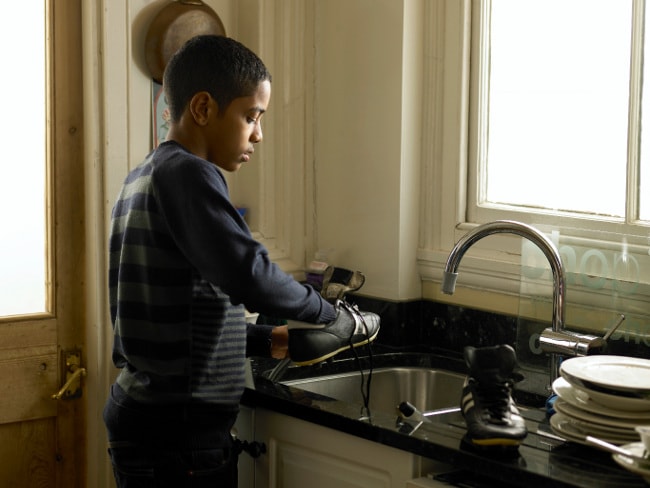7 surprising results when you pay your kids for chores
One of our parenting goals is to rear frugal kids. Take care of their stuff. Spend wisely. Save for a rainy day.
Making the goal is easy, but implementing the goal? Definitely harder.
How Our (Current) Allowance System Works
Over the last couple of years, we’ve been experimenting with the best ways to teach our kids to manage money. What I’ve learned is that it’s best to keep our system flexible as the kids mature and develop more skills. So we decided that our system will probably always be subject to change so we can accommodate their growth, but here’s how our family’s allowance system currently works:
Family Allowance System
- Each child has a spiral notebook.
- Every day, write down the jobs they need to complete. This includes things they need to do for music lessons or school. Add in things that help the entire household run more smoothly.
- They check off each task as they complete it.
- If they complete all their jobs, write in the standard pay rate. If they don’t? Nada.
- At the end of the week, total each day and pay them.
- They must give 10 percent and save 10 percent in their savings account, but the rest is pretty much up to them.
It’s Not Without Challenges
I say that what they do with the rest of their earnings is “pretty much up to them” because sometimes we have to intervene a little bit. (See the shoe example below.) So that’s a bit of a challenge, but there’s other issues to tackle too. If you pay your kids for chores, do you have similar challenges to ours?
Challenges of Paying Your Kids for Chores
- Finding the balance between having enough jobs for them to do, while still allowing plenty of play time and down time.
- Deciding how much to pay them — enough so they’re motivated, but not too much so they stop being hungry for more money-making opportunities. (But how much is that?)
- Figuring out what they should be responsible to pay for themselves
- Thinking through whether any restrictions should be placed on what they can buy.
- Defining age-appropriate expectations.
- Teaching a healthy relationship to money.
7 Surprising Results When You Pay Your Kids for Chores
This isn’t a perfect system, but I wanted to share what surprised me. And you may notice similar things too.
1. They take better care of their stuff.

Our current system actually started when I decided the kids needed to buy their own tennis shoes for school.
When I bought their shoes, they didn’t take care of them. To say the least, our kids’ shoes weren’t looking good at the end of the last school year. For the 2015-16 school year, it was time they bought their own shoes.
I figured out how much I would need to pay them each day in the summer so they would be able to pay $50 or so for a pair of tennis shoes and still have about $100 left over after their giving/saving money.
In the spirit of keepin’ it real, I need to tell you that this was too overwhelming for my eight-year-old. She often didn’t complete her jobs for the day, because she just wanted to play. She squeaked by with enough money for shoes, but had very little left over. She also doesn’t seem as interested in caring for her shoes. Maybe she’s not developmentally ready for this?
On the other hand, our 11-year-old takes GREAT care of his shoes. He rarely wears them outside just to play. Multiple times he’s told me that he wants to make them last as long as possible.
2. They make some choices based on quality vs. quantity.

Going back to the shoe example, I explained that I had learned that cheaper shoes weren’t always the best value. However, they could choose their own shoes and spend as much (or as little) as they wanted. They bought more durable shoes.
Not all their purchases are as mindful yet, though.
3. They prioritize their own wants and spending.

If they ask for anything extra, I’ll usually ask them to buy it.
If they really want something, I don’t mind chipping in. But almost 100 percent of the time, they either didn’t really want it enough in the first place or they easily make a plan to get it.
For example, my daughter’s school book fair was last week. She didn’t have quite enough money for the book she wanted, so she asked for extra jobs to earn more. She eagerly did enough jobs to earn enough to make up the difference.
4. They manage their time better.

Slowly, I’m starting to see them plan their afternoons better. While they still have plenty of days where they play first, they’ve started working on their jobs first most days.
Too many times, they ran out of time before completing their jobs for the day. The only thing worse than not getting paid for doing nothing is to do some of the jobs and not get paid for it!
5. They look for entrepreneurial opportunities.

When our family complaint department gets complaints of low wages, I say I’ll accept proposals for a raise for additional responsibilities. So far, I haven’t received any proposals.
However, the kids are looking for opportunities to earn money from others.
I love to see their minds mull over the possibilities. And I love to discuss their ideas — How will you find customers? How much do they want/can they afford to pay you? Why would someone pay you when they could do it themselves?
6. This cuts down on conflict.

In my opinion, the best thing that’s come out of tying their chores to money is that it takes nagging out of the picture (almost – hehe).
At this point, they know they need to do their entire list to earn money. While I still get annoyed if I have to pick up their stuff or dry the dishes, I say to myself, “Their consequence for not putting their backpack away is not getting paid. A lecture is no longer included.”
Er, at least that’s how I want to be. Nagging and lectures come so easily, that I’m still working on that. But I’m getting a lot better. I still whip out lectures when the situation calls for it, but I try to let consequences be the lecture in most situations.
7. As they manage their money, they’re learning about sales tax, interest, prices, and bank deposits.

Having money to save and spend naturally helps introduce financial concepts to them. They now know they need to consider sales tax in addition to the list price (and shipping if they are ordering online). They look at their bank statements and see the measly interest added to their accounts.
They also seem to be making a connection between their efforts to earn money and what something costs.
While we have a long way to go and we’re still making a lot of mistakes, I am happy with the improvements this system has made to our home and their knowledge about money.
If you pay your kids for chores, what positive results have you noticed that surprised you? Do you face any challenges about allowances?
Become A Money Boss And Join 15,000 Others
Subscribe to the GRS Insider (FREE) and we’ll give you a copy of the Money Boss Manifesto (also FREE)

